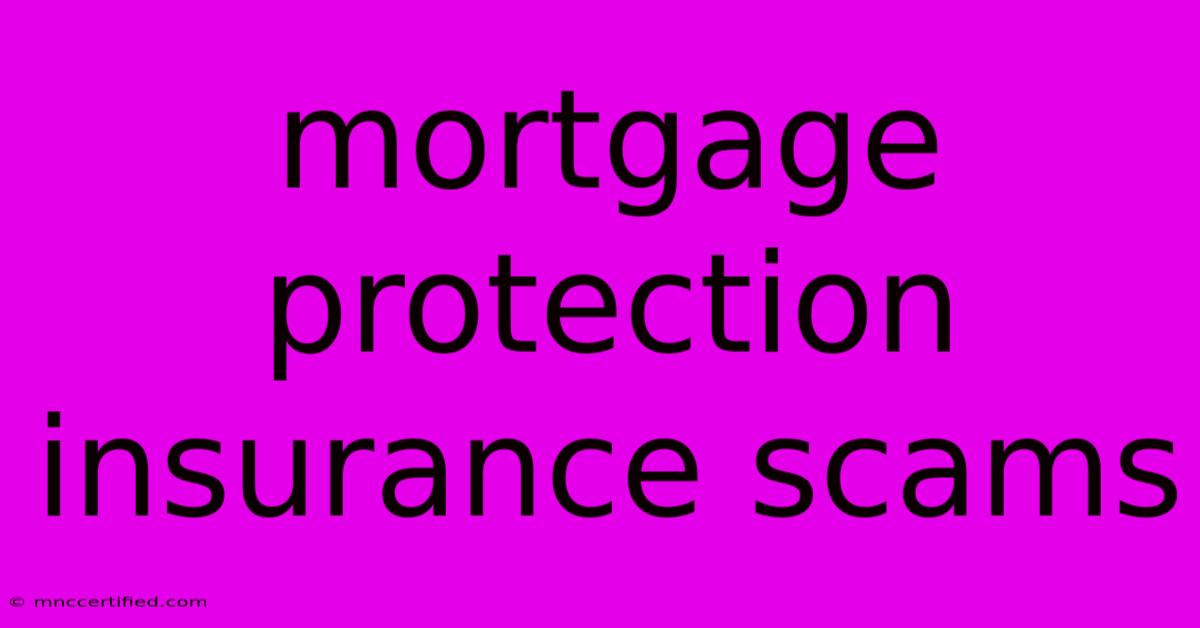Mortgage Protection Insurance Scams

Table of Contents
Mortgage Protection Insurance Scams: What You Need to Know
The promise of protecting your loved ones from financial hardship in the event of your death is a powerful one. This is the appeal of mortgage protection insurance, but unfortunately, it's also become a hotbed for scams. Mortgage protection insurance scams can leave you vulnerable to financial loss and emotional distress.
What is Mortgage Protection Insurance?
Mortgage protection insurance is a type of life insurance specifically designed to cover your mortgage in the event of your death. It pays out a lump sum, typically to your beneficiaries, which can be used to pay off the remaining mortgage balance.
**Here's the problem: **While legitimate mortgage protection insurance offers a valuable service, many unscrupulous companies and individuals prey on unsuspecting homeowners, promising protection that doesn't exist.
Red Flags of Mortgage Protection Insurance Scams
Here are some red flags to watch out for when considering mortgage protection insurance:
- High-pressure sales tactics: If a salesperson uses aggressive tactics, such as scare tactics or a sense of urgency, it's a warning sign. They may try to convince you to make a quick decision without giving you time to research.
- Hidden fees and charges: Be wary of companies that don't clearly disclose all fees and charges. These can significantly impact your overall cost.
- Exaggerated claims: If a company promises coverage that seems too good to be true, it probably is. Be skeptical of claims of "guaranteed acceptance" or "no medical exams required."
- Unsolicited contact: If you are contacted by a company out of the blue offering mortgage protection insurance, be cautious. Legitimate companies typically don't cold-call potential clients.
- No proof of coverage: Ask for a copy of the policy documents and review them carefully. Make sure you understand the terms and conditions before signing anything.
How to Protect Yourself from Scams
- Do your research: Before signing up for any mortgage protection insurance, research the company and its reputation. Look for independent reviews and ratings.
- Compare quotes: Get quotes from multiple companies to compare prices and coverage.
- Read the fine print: Carefully review the policy documents before you sign. Pay attention to any exclusions or limitations.
- Beware of "free" offers: If a company offers a "free" trial or consultation, be aware that they may be trying to collect your personal information to sell to other companies.
- Don't be pressured: Never feel pressured to make a decision on the spot. Take your time to weigh your options and get professional advice if needed.
Alternatives to Mortgage Protection Insurance
Instead of relying on mortgage protection insurance, consider these alternatives:
- Term Life Insurance: Term life insurance offers affordable coverage for a set period, providing a death benefit that can be used to cover your mortgage.
- Whole Life Insurance: While more expensive than term life, whole life insurance offers a permanent death benefit and can build cash value over time.
- Debt Consolidation: If you are worried about debt, consider consolidating your debt into a single, lower-interest loan.
Reporting Mortgage Protection Insurance Scams
If you believe you have been a victim of a mortgage protection insurance scam, report it to the following agencies:
- Your state insurance department: Each state has its own insurance department that regulates insurance companies and investigates consumer complaints.
- The Better Business Bureau (BBB): The BBB collects and reports consumer complaints and business ratings.
- The Federal Trade Commission (FTC): The FTC investigates and prosecutes companies engaged in deceptive or unfair business practices.
By being aware of the common red flags and taking steps to protect yourself, you can avoid falling victim to a mortgage protection insurance scam. Remember, a legitimate company will be transparent about its products and services, and it will be happy to answer any questions you have.

Thank you for visiting our website wich cover about Mortgage Protection Insurance Scams. We hope the information provided has been useful to you. Feel free to contact us if you have any questions or need further assistance. See you next time and dont miss to bookmark.
Featured Posts
-
Download Festival 2025 Lineup Announced Green Day Korn Lead
Nov 13, 2024
-
Waldron Fired After Bears 3 Point Offensive Struggles
Nov 13, 2024
-
Nba Cup Warriors Win With Currys Late Surge
Nov 13, 2024
-
Charter Boat Insurance Requirements
Nov 13, 2024
-
Upper Endoscopy Cost With Insurance
Nov 13, 2024